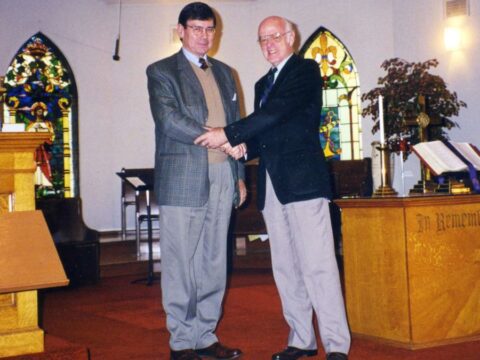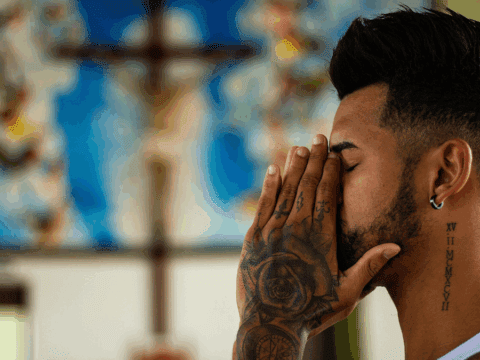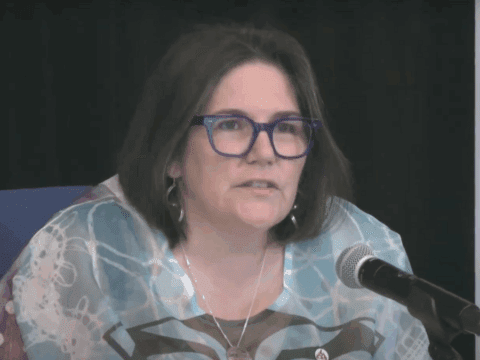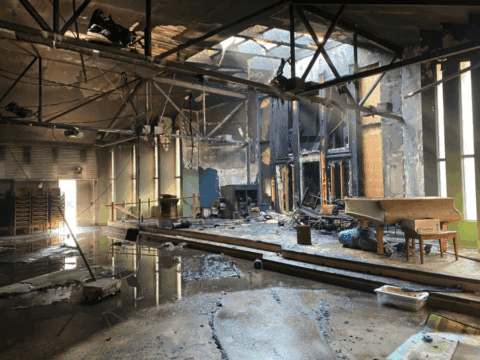The elected chief of a Vancouver Island First Nation leading the search for unmarked graves at a former United Church-run residential school says the nation is in the very early stages of dialogue with the denomination.
But while Tseshaht First Nation’s elected council has met with United Church representatives to discuss how the church could address the harm of its involvement in Alberni Indian Residential School, according to Tseshaht First Nation’s elected chief councillor Wahmeesh (Ken Watts), the community has more urgent priorities.
You may unsubscribe from any of our newsletters at any time.
The first phase of ground-penetrating radar scans on the site of the former residential school, near Port Alberni, B.C., started on July 11.
“Our priority right now is doing the research, the investigation and the scanning,” Wahmeesh told Broadview on June 6, adding that some survivors have already passed away since 215 potential unmarked graves were detected at the site of the former Kamloops Indian Residential School in May 2021.
The scans, according to a press release by Wahmeesh, will take place over two weeks “with compassion and care so as not to disrupt possible burial locations,” and be conducted in accordance with cultural protocols and in full consultation with survivors.
As the site of the former residential school is located on its traditional territory, Tseshaht First Nation is leading the project, which will affect over 100 First Nations communities in British Columbia that had children attend the school.
While Alberni was initially managed by the Presbyterian church beginning in 1900, The United Church of Canada operated the school from 1925 to 1969 — after which it was run by the Department of Indian Affairs until its closure in 1973.
According to Wahmeesh, Tseshaht First Nation’s elected council and members of the United Church met on April 25 to discuss how the United Church could address the harm of its involvement in Alberni. It was a preliminary conversation, he says, and next steps will include meetings between church members and Tseshaht First Nation’s hereditary chiefs, full council, community and survivors. “There are other people that need to be brought to the table,” says Wahmeesh.
Wahmeesh adds that he’s also aware of the potential legal ramifications of engaging in work with the United Church. “I’m very conscious of our legal reality as a nation,” he says. “Many nations have said that once they’re done their scanning, they consider that a crime scene. We’re not committing to anything with the United Church — just discussions, that’s all.”
“If [the United Church and Canadian government] can fund and run places that did so much harm, then they can also fund and run places to help us heal from what happened there.”
Regarding the potential exhuming of bodies, Wahmeesh asks, “What does it mean for everybody’s relationship? What’s next for those involved in residential schools?”
“There’s a lot of healing to do, a lot of conversations to have,” he adds, noting that any future meetings with the United Church will need to engage with the wider Tseshaht First Nation community, particularly residential school survivors. “You can’t undo decades of what happened overnight,” he says.
United Church communities of faith in Port Alberni, B.C., have been hosting conversations, including sharing circles, with a small group of Alberni survivors from various nations on a regular basis. However, Wahmeesh declined to comment on that work, saying that the wider Tseshaht First Nation community has not attended or been invited.
A proposal brought before General Council 44, which will be voted on in decision sessions from July 21 to July 25, emerged out of the gatherings. It calls for the United Church to “address the harm caused by its Alberni Indian Residential School” through concrete action, such as offering to conduct a forensic archaeological search, offering to exhume, identify and repatriate remains, and developing a plan and funding model for a healing centre on the site of the former residential school.
More on Broadview:
- A year after the Kamloops news, Indigenous communities are still looking for buried children
- These Indigenous activists stood up for their rights and were forced to flee Russia
- New initiative helps First Nations identify unmarked graves
During a General Council learning session on May 4, Rev. Gail Miller, a co-author of the proposal and a staffperson with Pacific Mountain Regional Council, said the members of the council told the United Church on April 25 that they wanted the Canadian government, not the United Church, to assume responsibility for the forensic archaeological search. Nor were they interested in the proposal’s recommended offer of exhuming bodies. “In this proposal, what they were most interested in talking to us about,” Miller says, “was the plan and funding model for a healing centre.”
While he prefers the term “health and wellness centre” to “healing centre,” Wahmeesh confirms that there may be community interest in such a space. “We’ve heard survivors and members here say the same thing — that the United Church and Canada need to step up,” he says. “If they can fund and run places that did so much harm, then they can also fund and run places to help us heal from what happened there.”
If you are a residential school survivor, or have been affected by the residential school system, you can call the 24-hour Indian Residential Schools Crisis Line at 1-866-925-4419.
***
Julie McGonegal is an associate editor at Broadview.















The surviving individuals are the people who need healing and reconciliation with God, who sent his only begotten son out into the world, not to condemn the world but to save the world through him. John 3:17. We have a timeline here as many are elderly, honour them in the here and now. The day before the Queen crossed the river she sent her message directly to the hurting people here. Focus your love, healing and compassion on today’s children of God. Internal healing within the body of Christ is the only way to achieve this. Yesterday’s children have crossed the river, because He lives all fear is gone.